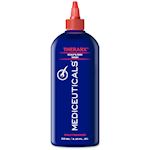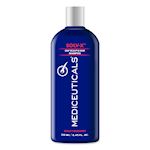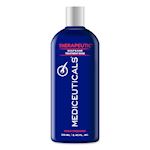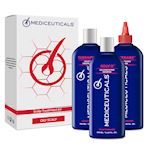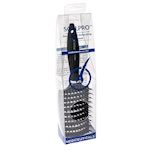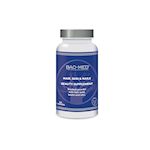-
DO YOU SUFFER FROM OILY HAIR OR AN OILY SCALP?
Do you suffer from greasy, sticky hair that falls in front of your face? Or does your hand feel greasy when you run it through your hair or over your scalp? And that while you have only just washed your hair? Then your hair and scalp are oilier than normal. Everyone has to deal with this sometimes. It doesn't mean your hair or scalp is dirty, but it probably feels that way. And you may feel like you look unkempt even though you just wash and condition your hair. In addition, an oily scalp can also be very itchy.
Enough reasons to want to get rid of it as quickly as possible. You can read how to do that later in this blog. First, we will tell you about the origins and causes of oily hair and an oily scalp.
-
WHAT IS OILY HAIR OR AN OILY SCALP?
We all suffer from greasy hair or an oily scalp sometimes. It is completely normal for the hair to become greasy over time. This just happens faster for some than for others. For a healthy scalp, a little sebum (oil) is not bad at all. The production of sebum is natural and even necessary because it moisturizes the scalp and hair and balances the pH level of the scalp. This protects and supports the condition of healthy hair.
Things go wrong when there is excessive sebum production on the scalp, causing the hair to feel greasy or dirty all day long. Without treatment, this can lead to clogged hair follicles and sebum accumulation, which increases the risk of hair loss.
Sebum is a natural substance that the sebaceous glands secrete. These glands are found all over the body (with the exception of the palms of the hands and soles of the feet) and regularly produce sebum (oil). If the glands produce too much sebum, this leads to an overproduction of sebum (oil). This contributes to greasy hair and an oily scalp and also causes acne on the body or face.
WHAT CAUSES GREASY HAIR OR AN OILY SCALP?
Excessive sebum production on the scalp is the cause of greasy hair or an oily scalp. But that excessive sebum production also has a cause. Below we list the most common causes:
- Hormonal changes (due to puberty, menstruation, pregnancy or menopause).
- Diet (an unhealthy diet with too many sugars or saturated fats).
- Stress (production of cortisol and testosterone causes increased sebum production).
- Using the wrong and often too aggressive hair products.
- Heredity (genes can influence the amount of sebum (oil) the glands produce).
- Hot weather, showering too hot, or using heat styling.
TREATMENT FOR OILY HAIR OR AN OILY SCALP
Greasy hair and an oily scalp are very annoying. It probably feels like you can keep washing your hair, but nothing will change. That's because washing a lot is not the solution. What should you do then? You can read that below:
Using the right hair care products
With oily hair and an oily scalp, it is important to treat your hair and scalp with the right hair care products. This prevents the situation from worsening, resulting in the hair becoming greasy even faster. Also, do not use more than the size of a euro coin in shampoo.
When washing, use a good shampoo that cleanses and soothes the scalp without removing the essential fatty acids from the scalp. At Mediceuticals we have the Solv-X shampoo that does exactly that. After using this shampoo, it is also important to neutralize the acidity (pH value) of the scalp with a scalp conditioner.
If your hair and scalp are very greasy, then at Mediceuticals we also have the Scalp Treatment Kit Oily Scalp. In addition to the shampoo and conditioner, you will also find the Therarx, which you use before using the shampoo. Leave this pre-treatment on a dry scalp for 1 to 2 minutes and you do not need to rinse it out.
Do not shower too hot
Heat is one of the things that stimulates sebum production. That is why your hair often becomes greasy more quickly in the summer than in the winter. A nice hot shower is of course wonderful (especially in winter), but it also stimulates sebum production. It is therefore advisable not to shower too hot.
Don't run your hands through your hair
Another thing that stimulates sebum production on the scalp is brushing the hair too often or running your hands through your hair. The hands are also relatively greasy, which only makes your hair greasy.
Do not massage your scalp
Massaging the scalp while washing your hair is of course very pleasant, but that also stimulates the production of sebum. Massaging stimulates blood circulation. Due to good blood circulation, the amount of sebum increases again. Therefore, try to leave the oily scalp alone as much as possible.
Do not use heat styling
Blow-drying the hair or using a hair straightener dries out the hair at the bottom. At the top, the heat causes greasy hair and an oily scalp. This is again due to the heat. Just like taking a hot shower, the heat stimulates the production of sebum. It is better not to blow-dry or style your hair temporarily.
Eat healthy and drink plenty of water
A healthy diet and plenty of water are good for your entire body. The same goes for your hair. Eating very fatty foods also makes your hair and scalp oilier. That means you should avoid fat altogether. This concerns saturated fats, such as butter or chips. It is better to leave it for a while.
Unsaturated fats such as vegetable oils and fish fit within a healthy lifestyle. Also, drink plenty of water. This is good for the hydration of the scalp so that sebaceous glands do not have to produce sebum for a dry scalp.
NO MORE GREASY HAIR OR OILY SCALP
Greasy hair and an oily scalp are very annoying. Your hair and head feel sticky and dirty. In addition, your scalp can be very itchy and oily hair can also develop an unpleasant odor. These are all reasons to take action quickly if you have greasy hair or an oily scalp. Fortunately, both are easily treatable.
By using the right hair care products, it is possible to stop excessive sebum production. In addition, there are a number of other simple things you can do to help with oily hair or an oily scalp.
-
DO YOU WANT MORE INFORMATION ABOUT MEDICEUTICALS?
For personal advice you can contact us or make an appointment at one of our certified Mediceuticals salons.




